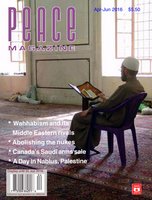
Peace Magazine Apr-Jun 2016, page 4. Some rights reserved.
Search for other articles by Metta Spencer here
This issue is mainly about the Middle East—a Byzantine place where political deals are shaped by ancient religious rivalries, tribalism, patriarchy, defunct empires, Cold War blocs, and the daily price of oil. There, more than informing ethical choices,religion serves to instruct everyone whom to hate and whose traditional barbarisms discreetly to overlook. Nor is such doublethink limited to the locals, for Canadians, Americans, Russians, and Europeans feel duty-bound to help certain groups bomb others, yet are astonished when the refugees escaping those bombs pour into their own lands, needing help.
But long-standing cleavages and alliances may be shifting in the region. The House of Saud, for example, despite its medieval repressiveness, could long count on oil-thirsty Western states for support against non-Arabic, Shi’ite Iran. That alliance may be wobbling today, partly because the West, finally exasperated with Saudi funding of Wahhabian terrorism, is tilting toward Iran, and partly because Europeans, unable to accept more refugees, must finally end the war in Syria, even if it means letting Assad linger on, as his Iranian allies demand.
Enter Vladimir Putin—and now, exit Vladimir Putin. His troops succeeded after only six months in Syria. Evidently his goals were limited—not to grant Assad victory, but only to re-establish the broken stalemate, which would make possible a ceasefire and negotiations, with Russia at the table. One must admire Putin’s astute strategy and the beneficial result of his intervention, even while deploring the violence it inflicted on the wretched Syrians who only wanted peace. The Syrian population is one-third less than before this civil war, which has helped no one at all. But there is a peace process now and Russia is shown itself to be—okay?— an indispensable world power.
So what other changes in the region will follow? Will human rights be more secure anywhere? Probably not in Turkey, which is becoming less democratic. Probably not in Palestine, for Netanyahu continues to enjoy Westerm support (though a presidential win for either Sanders or Trump might change that).
But if there is little hope in the Middle East, there are grounds for hope in the matter of nuclear disarmament. In The Hague the World Court is hearing the Marshall Islanders’ case, and in Geneva the Open-Ended Working Group has met to invent new angles. But please hurry! The Pakistanis are building more nukes and tactical missiles, and other states are “modernizing.”

Peace Magazine Apr-Jun 2016, page 4. Some rights reserved.
Search for other articles by Metta Spencer here